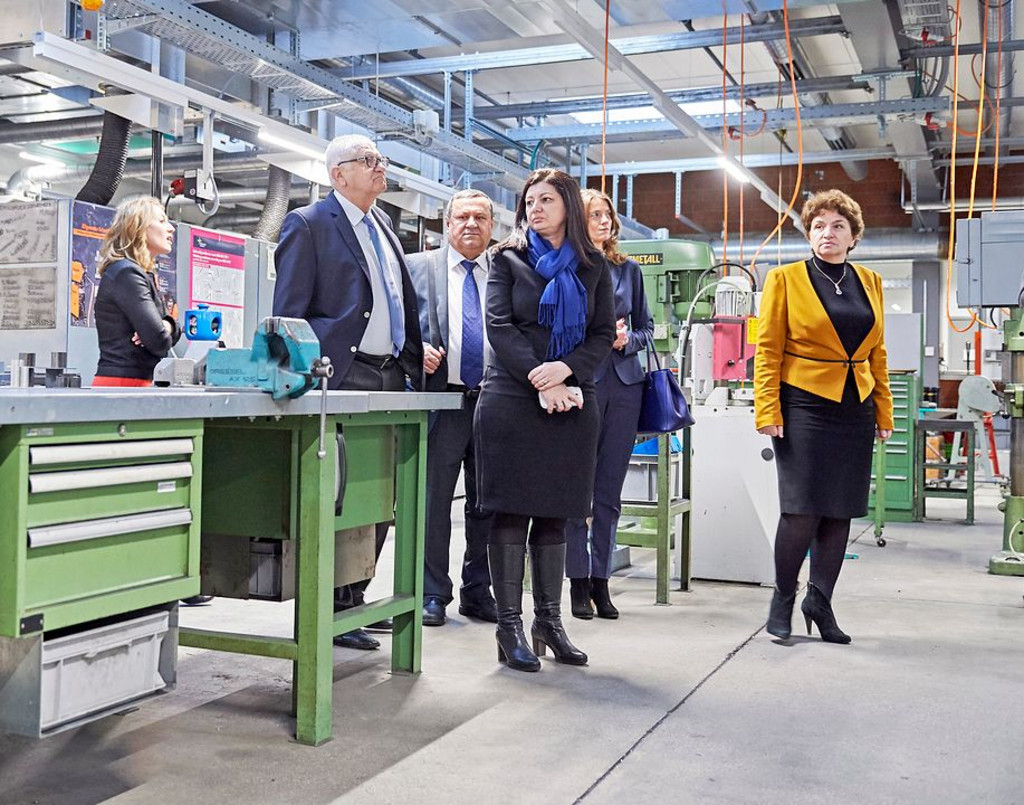It must be tangible – that was the principle adopted in the early 1960s when Switzerland began providing government development aid. “Tangible” meant ridding the world of hunger and poverty but through substantive projects that conveyed typically Swiss application-oriented knowledge and skills as well as Swiss values. As a nation of mountains, cows and skilled cheese-makers, Switzerland did the obvious thing. Swiss development aid workers spread out across the Peruvian Andes and trained impoverished hill farmers in purpose-built cheese dairies. Non-governmental development aid workers from Switzerland had previously done the same thing in the mountains of Nepal. Peru and Nepal represent the idea of driving forward broad development by conveying professional expertise, helping those in need to find employment and improving their diets – thanks to good milk.
What was achieved was, of course, not quite as perfect as hoped for. The “export” of the Swiss dual track vocational education and professional training system has nevertheless been an enduring issue ever since. There is a long list of Swiss vocational training projects covering Bolivia, Burkina Faso, Ghana, India, Indonesia, Myanmar and many other countries extending right back to Nepal, the country where the first pilot projects took place. Today, Switzerland is helping to set up courses there which can be attended whilst also in employment.
The reputation of the Swiss vocational training system even impresses major industrial nations. In 2015, the USA signed an agreement with Switzerland on vocational training. The USA hopes to discover why Switzerland is so successful at producing the professionals sought by the business community. Suzi LeVine, US ambassador in Berne, finds it “fascinating” how companies and state vocational schools interact in Switzerland.
Two thirds opt for an apprenticeship
Swiss professionals are not surprised. The dual track vocational education and professional training system enjoys great prestige in Switzerland. Two thirds of all young Swiss people opt for an apprenticeship over pre-university education spent entirely at a grammar school. They do so because the dual track system is an unequivocal success story. Switzerland’s competitiveness is attributable to the country’s well-educated specialists, and the dual track vocational education and professional training system is arguably the main reason for the low rate of youth unemployment. The system does not turn out unemployed graduates. While the average rate of unemployment in Europe stands at 10 %, it is 3.3 % in Switzerland. The demeaning experience of not finding a role in the modern working world is not something shared by the vast majority of young adults in Switzerland.
This result is astonishing as the Organisation for Economic Co-operation and Development (OECD) is a regular critic of the Swiss education system. It complains that the rate of those obtaining entrance qualifications for higher education is the lowest of any European country. While well over 60 % of all young people achieve such qualifications on average in Europe and then go on to enrol at university, the rate only stands at 20 % in Switzerland. This supposed distance from the academic world is a consequence of the “successful product”. The Swiss dual track vocational education and professional training system is integrated into an extremely permeable education system that provides alternative routes to higher education. Every vocational qualification without exception provides opportunity for further education. It is commonplace in Switzerland today for young people to opt for the dual track vocational education and professional training system and to sit university-entrance examinations either in parallel to their training or during the first few years of their career. This “vocational baccalaureate” opens the door to universities of applied sciences as well as traditional ones. Around 40 % of students today went through the application-oriented dual track vocational training system first, and this number is rising.
A tendency towards idealisation abroad
A low rate of university entrance qualifications, low youth unemployment and no major shortages of specialist workers – these key points explain why the Swiss model is regarded as a paradigm. Last summer, Serbia joined the list of nations keen to adopt the model. Serbia’s neighbour Bulgaria, where a rapid reform of vocational training is underway, is much further along the road. Swiss education experts talk of a “highly promising” transformation in the case of Bulgaria. However, such reports can result in idealisation. The experiences of the last 50 years show that the transfer of the dual track vocational training model has its limitations. It can almost never be transferred directly. Modifications to take account of country-specific circumstances are inevitable. First and foremost, it is necessary to remember that Swiss vocational training is based on the fundamental principles of a nation forged by the will of the people and a system whereby local politicians work only part-time under their public mandate. The economy and training enterprises assume a great deal of responsibility and the state creates the stable legal framework required. Such conditions rarely exist in developing countries in particular. From an historical perspective, the Swiss dual track vocational education and professional training system has been developing for over 200 years – emerging from the guild system that put great emphasis on and took pride in craftsmanship. Artisans’ professions shaped their identity and ensured social status. That continues to apply today.
The tangible approach of long ago – teaching farmers in remote mountain regions how to make cheese – sometimes leads to a glorified portrayal of Switzerland’s current efforts in support of vocational training in developing and transitional countries. The Swiss Agency for Development and Cooperation (SDC) now invests barely 4 % of its resources in vocational training projects in the strict sense of the term. It is much less still for the countries of eastern Europe. Rudolf Strahm, an economist who is an expert in education and development aid, is critical of this development. Swiss development aid has neglected its original principles in this respect, he says. Today it spreads its funding across many countries and issues. Experts from different backgrounds concur with Strahm’s criticism or at least explain the trend apologetically. Development targets are constantly being shifted worldwide. With the UN’s Millennium Development Goals, supported by Switzerland, the emphasis in education has moved away from vocational training towards basic education and literacy. The logic behind this is understandable. The best vocational training system is of little use if underprivileged youngsters do not learn to read and write. But the wind is now changing direction again as the new UN Agenda for Sustainable Development is calling upon the international community to pave the way to affordable and high-quality vocational training for everyone.
Tool of economic diplomacy
The transfer of education is obviously not solely the remit of the SDC in Switzerland. Simonetta Sommaruga (SP), Minister of Justice, is now also an advocate for vocational training projects abroad. She wants greater investment in vocational training in the countries where asylum seekers come from. As migration from poverty has become a permanent phenomenon, this approach may become more important in future. However, the dual track vocational education and professional training system as an export success has the most indefatigable of supporters in Federal Councillor Johann Schneider-Ammann. He has turned this system into a tool of Swiss economic diplomacy. The number of foreign trade delegations which are closely scrutinising the Swiss vocational training system is constantly increasing.
This offensive is nonetheless not without dissonant voices. Mauro Dell’Ambrogio, State Secretary for Education, Research and Innovation, bluntly declared at the end of 2015 that he knew of a handful of successful “isolated experiments” at most, but not of any country that had set up a dual vocational training system from scratch. The “global admiration for the Swiss education system” was seductive, he said. However, the fact that “incompatible application of the model” can actually result in damaging consequences – such as older employees having to accept lower wages on the pretext of a lack of vocational training – is overlooked. Apprenticeships require prestige in order to be attractive. “However, prestige is only achieved as a result of qualified trainees going on to enjoy successful careers, and such examples do not exist in the beginning.”
Prestige is key
Dell’Ambrogio’s views were widely criticised. Many experts nevertheless essentially endorse them. The success of training is heavily dependent upon its prestige. Whereas Swiss apprentices proudly point to the education pathways open to them, there are often huge reservations about application-led training in the destination countries of the “educational export”. Trades are often seen as having a lower status and offering few prospects. There is certainly no lack of examples illustrating this view. When Caritas wanted to implement vocational training projects in Kosovo, the local authorities gave the charity a warm welcome. However, the authorities were initially not interested in vocational training. They wanted university courses. Caritas had to put a slant on its argument and advised running some vocational education courses under the aegis of a university for image reasons.
Marc Lettau is an editor with “Swiss Review”
The dual track vocational education system
Technical and academic subjects are taught in tandem in a dual track vocational education system. Trainees spend three days of the week working at their training enterprise, for example, and attend technical college for two days where general subjects are also on the curriculum. In Switzerland, federal government, the cantons and industry organisations work together on vocational training. This means that the business world is not a “recipient” of trained specialist workers but instead has a considerable degree of responsibility for their training. (mul)
Bulgaria – Swiss training provides “all the answers and the best solutions”
The vocational school in Thun frequently receives guests. After delegations from South Korea, Cambodia, Kazakhstan, Russia and Greenland, it is now the turn of groups from Bulgaria to visit Thun. Sofia has sent over company representatives and vocational college lecturers who are meant to take on board the concept of the interconnected Swiss vocational training system where vocational schools, industry associations and the government mutually complement one another.
Vassil Radoynovski of the Bulgarian-Swiss Chamber of Commerce believes there are compelling reasons why his country should rapidly reform its vocational training system. Vocational training had been neglected since the political change in 1989. “There were still vocational schools, but nobody monitored their quality. Today, we are observing with concern that youth unemployment is high while companies complain that they cannot find skilled specialists.” This paradox – lots of people seeking work while many firms say they cannot find workers – is the principal driving force behind the reform of vocational training based on the Swiss model.
Meglena Plugtschieva, Bulgaria’s ambassador in Berne, is a passionate supporter of the Swiss dual track vocational education and professional training system. She says the Swiss model provides “all the answers and the best solutions” for the current challenges facing young people in her country. Plugtschieva also made a strong appeal for Swiss support after the first attempts at improving the education system in her country failed. Switzerland’s involvement has “resulted in a huge opportunity to push forward a fundamental reform of our vocational training system”, she says.
It is striking how broadly based the reform is. On the one hand, companies are directly involved. On the other, the highest level of government also lends its support. Bulgaria’s President Rosen Plevneliev focused heavily on vocational education and professional training during his first term of office that ended recently. On a state visit to Switzerland in 2014, Plevneliev even left Didier Burkhalter, President of the Swiss Confederation at the time, waiting because he wanted to visit the vocational school in Berne first and talk to apprentices.
Within a year of this faux pas, the first classes of prospective cabinet makers, automotive mechatronics specialists, electronics technicians and dairy technologists began their training in Bulgaria. The first apprentices in other careers will start their courses in 2017. A legislative reform enabling young people to enter into apprenticeship contracts was also pushed through.
“The pressure of reality” has meant reform taking place at a great pace, says Plugtschieva. In addition to its speed, the extent of change is also a key factor. The “Swiss project” extends far beyond education policy: “By increasing the prestige of careers and vocational education, we are changing the mindset. We are creating prospects. We are providing grounds for saying: there is a future in our country for our young people,” she says. That is vital for their self-esteem, especially as everyone knows that “turning our young people into economic refugees is not good”.














Comments
Comments :
Nach 14 Jahren in Australien kann ich wohl sagen, dass die positiven Auswirkungen des schweizerischen Berufsbildungssystems in Bezug auf das gesellschaftliche und wirtschaftliche Wohlbefinden eines Landes noch wesentlich tiefer greiffen als im Artikel dargestellt. Guter Artikel!
Il est à noter que le modèle de formation Suisse est auto enrichissant d'où l'importance du facteur temps dans sa mise en oeuvre.
"Nécessite la valorisation du travail manuel (artisanal)" : Valorisation ne pouvant être faite et appréciée que sur la base des premiers résultats obtenus.
"La contribution des PMI/PME est indispensable" : Celles-ci n'y contribueraient délibérément qu'une fois convaincues des résultats qu'elles pourraient en escompter.
"L'encadrement professionnel de ces jeunes doit être effectué par des personnes certes qualifiés et certifiées mais qui devraient êtres elles-mêmes issues du monde de la formation professionnelle" : Plus le nombre de ces encadreurs est important plus les opportunités d'encadrement le seront.
En conclusion, un processus auto enrichissant où le facteur temps compte énormément.
The Swiss apprenticeship program is effective because all trades participating commit to provide the teaching and guidance required with field and trade school work . The relationship between labor department and trade in business is the key to a successful apprenticeship program ,schooling curriculum must be create and under their jurisdiction .The apprentice must be credit with a certificate .Every country that establish an apprenticeship program with the Government leadership it needs is ahead in every aspect of labor force and national productivity .simple fact , the trade gets low cost labour in return for education and people get free education and work ,quality of life gets a big booster !
"Swiss vocational training is based on the fundamental principles of a nation forged by the will of the people and a system whereby local politicians work only part-time under their public mandate. The economy and training enterprises assume a great deal of responsibility and the state creates the stable legal framework required."
Full time politicians mean you can't train students to be workers? You need a mystical sense of nationalism? Sorry, but that is utter tosh. As for private sector enterprises and training institutions mattering, yes, I would have expected that ... the point of exporting it is to show how it is done. It would be much more helpful if you actually walked through some disappointments and showed what the obstacles were and why they couldn't be overcome.
That makes sense, just the english translation is a bit unfortunate.
Ingrained in the value system of the Swiss people.
Established many centuries ago. Challenged but defended with pride.
Its one system that I personally envie most from Switzerland, and that our country (South Korea) would need most...
Da darf weder heute noch in Zukunft ein, wie auch immer gearterter
Rotstift, angesetzt werden.
Das ist auch das, was den schweizer Berufsmann von seiner auslän-
dischen Konkurrenz in jedem Punkt unterscheidet.
Tragen wir Sorge zum Bestehenden.